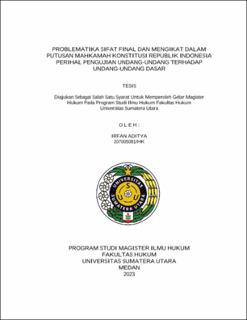Problematika Sifat Final dan Mengikat dalam Putusan Mahkamah Konstitusi Republik Indonesia Perihal Pengujian Undang-Undang terhadap Undang-Undang Dasar
Problems with the Final and Binding Characteristics of the Decision of the Constitutional Court of the Republic of Indonesia Regarding Review of Laws against the Constitution

Date
2023Author
Aditya, Irfan
Advisor(s)
Nasution, Faisal Akbar
Afnila
Sihombing, Eka N.A.M
Metadata
Show full item recordAbstract
The final decision that the Constitutional Court made turns out having a few of Constitutional Court that is not obeyed. Hence, it’s not aligned with the nature of the Constitutional Court itself. This research is made to know about how is the implementation of the judicial review on the Supreme Court and on the Constitutional Court as the executor of the judicial power, knowing the meaning that is contained on the final and bind the Constitutional Court’s decision based on the perspective of UUD NRI 1945, and knowing how is the solution to the follow-up of the Constitutional Court’s decision that’s final and implementative.
The method of this research is the normative law research with the statue approach. The source of the data that is used is a secondary data with primary legal material, secondary legal materials and tertiary legal materials, data analysis was carried out using the qualitative methods.
The results show that the Supreme Court and the Constitutional Court as the executor of judicial power has the same right, which is judicial review. However, the things that is differentiate them is the object of the test. The Supreme Court has the judicial review right to the legislation under the constitution to the constitution itself, while the Constitutional Court has the judicial review for the constitutional to UUD NRI 1945. The final and binding construction of the nature of the Constitutional Court Decision according to the perspective of the 1945 Constitution of the Republic of Indonesia is because the Constitutional Court is designed to be an independent judicial power-executing institution, so that the position of the Constitutional Court as the guard and guardian of the constitution as the highest law in Indonesia results in its decision being final. There are several factors that caused the Constitutional Court Decision to not be implementative, which are: the Constitutional Court as a negative legislature; no decision executorial institution; there is no grace period to carry out the decision; and there are no juridical consequences for ignoring the decision. Therefore, the solution is to form an executive working unit for decisions under the Registrar's Office of the Constitutional Court to provide coercive power to the parties concerned and if the Constitutional Court Decisions are still not complied with and enforced, then the related parties will be subject to sanctions.
Collections
- Master Theses [1926]
